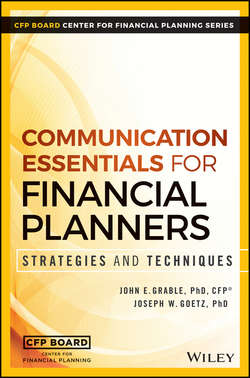Читать книгу Communication Essentials for Financial Planners - Grable John E. - Страница 5
На сайте Литреса книга снята с продажи.
Preface
WHY THIS BOOK
ОглавлениеOver the past two decades, myriad financial planning practitioners have emphasized the importance of client communication to business success and client satisfaction.5 In fact, the authors, who regularly hear practitioners speak about their professional roles when invited by their university’s student financial planning organization, have noticed a consistent emphasis on client communication and relationship building as the foundation of each presenter’s success. Many of these practitioners believe strongly that their method of client communication is effective, and undoubtedly it is at some level, but what they may fail to consider is whether another communication strategy or skillset could work even better. As will be highlighted throughout this book, the study of communication and counseling skills can assist even those financial planners who are already quite proficient communicators to become even more effective in their work with clients.
Current financial planning practice standards mandate that anyone hoping to become a Certified Financial Planner (CFP®) professional must obtain proficiency in the following interpersonal communication domains:
■ Evaluating client and planner attitudes, values, biases, and behavioral characteristics and the impact these have on financial planning
■ Principles of communication and counseling
The CFP Board’s requirement goes beyond a theoretical understanding to requiring proficiency. The role of communicating effectively with prospective and current clients permeates the financial planning process. Consider the CFP Board’s standards related to professional conduct and fiduciary responsibility, disciplinary rules and procedures, and practice standards. According to the CFP Board, practice standards are intended to:
1. Assure that the practice of financial planning by CFP® professionals is based on established norms of practice
2. Advance professionalism in financial planning
3. Enhance the value of the financial planning process
Practice standards apply to all CFP® professionals and those studying financial planning in a CFP Board Registered Program. The standards, however, also serve as a foundation for professionalism within the broader financial services profession. Practice standards were first developed in 1987, updated in 1994 by CTB/McGraw-Hill, an independent consulting firm, and again in 1999 by the Chauncey Group. These standards, tied directly to steps in the financial planning process, are shown in Table P.1.
TABLE P.1 The Financial Planning Process and Related Practice Standards
Source: CFP Board, 2016: www.cfp.net/for-cfp-professionals/professional-standards-enforcement/standards-of-professional-conduct.
What is important to remember, from the perspective of this book, is the role communication and counseling skills play at each step in the financial planning process. Imagine how challenging it might be for some financial planners if they needed to meet a prospective client who is unsure of his or her need for financial planning because of cultural or ethnic barriers. Without a systematic approach that can be used to build rapport through questions, feedback, and encouragement, this meeting could end up being a lost opportunity for both the client and the financial planner. Not only could the financial planner lose a potential client, the prospective client may shy away from needed behavioral change. The importance of applying appropriate communication and counseling techniques at each step of the financial planning process is just as important. As it turns out, not only are communication and counseling skills important attributes of professionalism, these skills often determine who has the greatest likelihood of becoming a client’s most trusted adviser.
Five communication tasks —or functions every financial planner needs to perform – have been linked in the academic literature directly with the CFP Board’s practice standards6:
1. Mutually defining the scope of an engagement before providing financial planning advice
2. Helping clients identify meaningful personal and financial goals
3. Applying a systematic communication and counseling process that helps clients clarify their financial and life goals
4. Taking time to explore and learn about each client’s cultural background, personality, attitudes, beliefs, and family history and values
5. Explaining how financial advice aligns with each client’s unique values, goals, and needs
Financial planners who embrace these five communication tasks with each client report greater client retention, higher client satisfaction, greater client cooperation, more openness in discussions, greater client disclosure, and more referrals.
While it is true that the CFP board requires all financial planning professionals who hold the CFP® marks, as well as those studying for CFP® certification, to exhibit communication and counseling proficiency, the purpose of studying communication and counseling is much more profound. Essentially, the manner in which a financial planner reaches out to others determines, to a large extent, that professional’s effectiveness in helping clients make life-changing decisions. We are not talking about helping salespeople sell one additional product or service as the end result, but rather, facilitating the growing professionalism of financial planning in the marketplace. Just as attorneys, accountants, and physicians must employ communication and counseling skills on a daily basis, the same is true for professional financial planners. An important outcome associated with reading this book, watching the accompanying videos, and practicing each chapter’s techniques should be a greater appreciation on the fundamental skill sets needed to be a competent financial planner in the twenty-first century.
5
H. Evensky, Put Your Mouth Where Your Money Is: The 9 Keys to Proactive and Interactive Communication for a Wealth Management Practice (Shrewsbury, NJ: Charter Financial Publishing Network, 2014).
6
C. Anderson and D. L. Sharpe, “The Efficacy of Life Planning and Communication Tasks in Developing Successful Client-Financial Planner Relationships,” Journal of Financial Planning 21, no. 6 (2008): 66–77.
